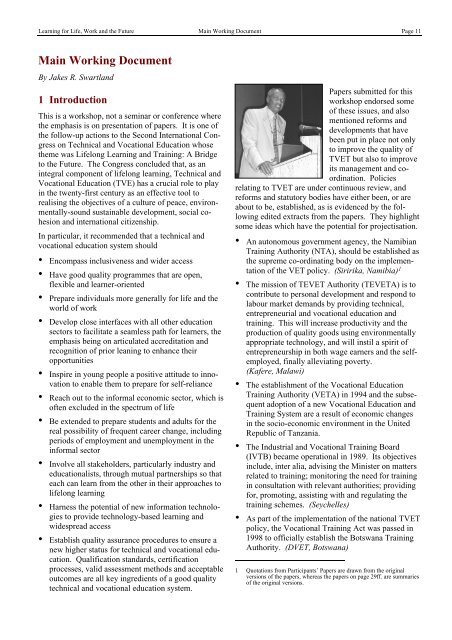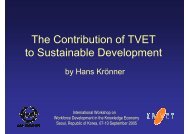Learning for Life, Work and the Future Initial ... - Unesco-Unevoc
Learning for Life, Work and the Future Initial ... - Unesco-Unevoc
Learning for Life, Work and the Future Initial ... - Unesco-Unevoc
Create successful ePaper yourself
Turn your PDF publications into a flip-book with our unique Google optimized e-Paper software.
<strong>Learning</strong> <strong>for</strong> <strong>Life</strong>, <strong>Work</strong> <strong>and</strong> <strong>the</strong> <strong>Future</strong> Main <strong>Work</strong>ing Document Page 11<br />
Main <strong>Work</strong>ing Document<br />
By Jakes R. Swartl<strong>and</strong><br />
1 Introduction<br />
This is a workshop, not a seminar or conference where<br />
<strong>the</strong> emphasis is on presentation of papers. It is one of<br />
<strong>the</strong> follow-up actions to <strong>the</strong> Second International Congress<br />
on Technical <strong>and</strong> Vocational Education whose<br />
<strong>the</strong>me was <strong>Life</strong>long <strong>Learning</strong> <strong>and</strong> Training: A Bridge<br />
to <strong>the</strong> <strong>Future</strong>. The Congress concluded that, as an<br />
integral component of lifelong learning, Technical <strong>and</strong><br />
Vocational Education (TVE) has a crucial role to play<br />
in <strong>the</strong> twenty-first century as an effective tool to<br />
realising <strong>the</strong> objectives of a culture of peace, environmentally-sound<br />
sustainable development, social cohesion<br />
<strong>and</strong> international citizenship.<br />
In particular, it recommended that a technical <strong>and</strong><br />
vocational education system should<br />
• Encompass inclusiveness <strong>and</strong> wider access<br />
• Have good quality programmes that are open,<br />
flexible <strong>and</strong> learner-oriented<br />
• Prepare individuals more generally <strong>for</strong> life <strong>and</strong> <strong>the</strong><br />
world of work<br />
• Develop close interfaces with all o<strong>the</strong>r education<br />
sectors to facilitate a seamless path <strong>for</strong> learners, <strong>the</strong><br />
emphasis being on articulated accreditation <strong>and</strong><br />
recognition of prior leaning to enhance <strong>the</strong>ir<br />
opportunities<br />
• Inspire in young people a positive attitude to innovation<br />
to enable <strong>the</strong>m to prepare <strong>for</strong> self-reliance<br />
• Reach out to <strong>the</strong> in<strong>for</strong>mal economic sector, which is<br />
often excluded in <strong>the</strong> spectrum of life<br />
• Be extended to prepare students <strong>and</strong> adults <strong>for</strong> <strong>the</strong><br />
real possibility of frequent career change, including<br />
periods of employment <strong>and</strong> unemployment in <strong>the</strong><br />
in<strong>for</strong>mal sector<br />
• Involve all stakeholders, particularly industry <strong>and</strong><br />
educationalists, through mutual partnerships so that<br />
each can learn from <strong>the</strong> o<strong>the</strong>r in <strong>the</strong>ir approaches to<br />
lifelong learning<br />
• Harness <strong>the</strong> potential of new in<strong>for</strong>mation technologies<br />
to provide technology-based learning <strong>and</strong><br />
widespread access<br />
• Establish quality assurance procedures to ensure a<br />
new higher status <strong>for</strong> technical <strong>and</strong> vocational education.<br />
Qualification st<strong>and</strong>ards, certification<br />
processes, valid assessment methods <strong>and</strong> acceptable<br />
outcomes are all key ingredients of a good quality<br />
technical <strong>and</strong> vocational education system.<br />
Papers submitted <strong>for</strong> this<br />
workshop endorsed some<br />
of <strong>the</strong>se issues, <strong>and</strong> also<br />
mentioned re<strong>for</strong>ms <strong>and</strong><br />
developments that have<br />
been put in place not only<br />
to improve <strong>the</strong> quality of<br />
TVET but also to improve<br />
its management <strong>and</strong> coordination.<br />
Policies<br />
relating to TVET are under continuous review, <strong>and</strong><br />
re<strong>for</strong>ms <strong>and</strong> statutory bodies have ei<strong>the</strong>r been, or are<br />
about to be, established, as is evidenced by <strong>the</strong> following<br />
edited extracts from <strong>the</strong> papers. They highlight<br />
some ideas which have <strong>the</strong> potential <strong>for</strong> projectisation.<br />
• An autonomous government agency, <strong>the</strong> Namibian<br />
Training Authority (NTA), should be established as<br />
<strong>the</strong> supreme co-ordinating body on <strong>the</strong> implementation<br />
of <strong>the</strong> VET policy. (Siririka, Namibia) 1<br />
• The mission of TEVET Authority (TEVETA) is to<br />
contribute to personal development <strong>and</strong> respond to<br />
labour market dem<strong>and</strong>s by providing technical,<br />
entrepreneurial <strong>and</strong> vocational education <strong>and</strong><br />
training. This will increase productivity <strong>and</strong> <strong>the</strong><br />
production of quality goods using environmentally<br />
appropriate technology, <strong>and</strong> will instil a spirit of<br />
entrepreneurship in both wage earners <strong>and</strong> <strong>the</strong> selfemployed,<br />
finally alleviating poverty.<br />
(Kafere, Malawi)<br />
• The establishment of <strong>the</strong> Vocational Education<br />
Training Authority (VETA) in 1994 <strong>and</strong> <strong>the</strong> subsequent<br />
adoption of a new Vocational Education <strong>and</strong><br />
Training System are a result of economic changes<br />
in <strong>the</strong> socio-economic environment in <strong>the</strong> United<br />
Republic of Tanzania.<br />
• The Industrial <strong>and</strong> Vocational Training Board<br />
(IVTB) became operational in 1989. Its objectives<br />
include, inter alia, advising <strong>the</strong> Minister on matters<br />
related to training; monitoring <strong>the</strong> need <strong>for</strong> training<br />
in consultation with relevant authorities; providing<br />
<strong>for</strong>, promoting, assisting with <strong>and</strong> regulating <strong>the</strong><br />
training schemes. (Seychelles)<br />
• As part of <strong>the</strong> implementation of <strong>the</strong> national TVET<br />
policy, <strong>the</strong> Vocational Training Act was passed in<br />
1998 to officially establish <strong>the</strong> Botswana Training<br />
Authority. (DVET, Botswana)<br />
1 Quotations from Participants’ Papers are drawn from <strong>the</strong> original<br />
versions of <strong>the</strong> papers, whereas <strong>the</strong> papers on page 29ff. are summaries<br />
of <strong>the</strong> original versions.





